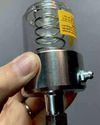
Therefore, embracing the inherent strengths of additional ancillary non-destructive testing (NDT) technologies provides a holistic approach and places your organization in a place to further succeed.
This isn't an either-or type of consideration. Incorporating elements of each can strengthen the foundation of an end user's current condition monitoring program, regardless of its current stage or level of sophistication.
Non-Destructive Testing
NDT is used to inspect and evaluate materials, components, or assemblies without destroying their service ability while ensuring product reliability, controlling manufacturing processes, lowering production costs, and maintaining a uniform quality level.
Source: ASNT
In this article, we'll discuss the traditional concept of used oil analysis the "why's", the "when's", and the "what can be improved upon" compared to the status quo.
In addition, you'll learn about three NDT technologies: vibration analysis, infrared (IR) thermography, and ultrasonics. We'll discuss the various strengths and challenges with each, and most importantly, how these applications complement one another on your journey to operational excellence.
Traditional Used Oil Analysis
Regardless of the maintenance, reliability, or condition monitoring program you have, oil analysis is one of the oldest, most economical, and most effective technologies available, and it should be the base for your entire program.
In my three decades of experience, oil analysis has been the primary tool in my arsenal, allowing me to catch and diagnose impending failures with great success. As with any NDT, it requires end-user expertise; they must have intimate domain knowledge to extrapolate the data and provide insights that can lead to corrective actions and predictable outcomes.
This story is from the March - April 2024 edition of MACHINERY LUBRICATION INDIA.
Start your 7-day Magzter GOLD free trial to access thousands of curated premium stories, and 9,000+ magazines and newspapers.
Already a subscriber ? Sign In
This story is from the March - April 2024 edition of MACHINERY LUBRICATION INDIA.
Start your 7-day Magzter GOLD free trial to access thousands of curated premium stories, and 9,000+ magazines and newspapers.
Already a subscriber? Sign In

The Secrets For Implementing A Clean lubricant Program
If you could find an investment that guaranteed a return 40 times greater than your initial investment, you probably wouldn't pass it up.

MAINTAIN? REPAIR? REPLACE?
When considering the life of any asset, the question arises: what types of interventions should be planned to keep it operating or to restore operation in the event of its failure?

Engineering Reports Should Be Like Bad Movies
I'm frequently asked to review engineering reports, and I'm continually baffled by how many engineers want to take their readers on a journey instead of getting to the point.

WHY SCHEDULED OIL CHANGES AREN'T ENOUGH TO MITIGATE LUBRICANT CONTAMINATION
There are few problems more insidious or damaging to large industrial machinery than contaminated lubricant.

LUBRICATION CONTAMINATION PREVENTION
How many articles have you read, or seminars listened to, that tout the value of contamination control? If you are like me, they number in the hundreds—if not thousands. One thing about these articles and seminars that bothers me is the word “control”.

LUBRICANT CONTAMINATION PREVENTION AND MITIGATION: A Guide For Maintenance Professionals
Lubricants are essential for the smooth and efficient operation of many types of machinery, from engines and turbines to gears and bearings.

TASK-BASED TRAINING | INSPECTING A SINGLE-POINT LUBRICATOR
A single-point lubricator is a device engineered to attach to a single unit to regularly and automatically deliver a small amount of clean grease or lubricating oil to a specific area.

TOP LEADERSHIP FOCUSES FOR IMPROVED RELIABILITY AND COST REDUCTION
Here’s a scenario that may sound eerily familiar – you have a new reliability initiative.

4 KEY ELEMENTS FOR INTERPRETING AN OIL ANALYSIS REPORT
Years ago, a customer came into my office, visibly upset. He had just received his second oil analysis report for one of his Caterpillar gas engines.

ASTM ENHANCEMENTS TO MICROSCOPIC PARTICLE IDENTIFICATION AND DOCUMENTATION
In 1982, Daniel Anderson published his influential book, \"Wear Particle Atlas\", which describes, sizes, and classifies particles found in oil.